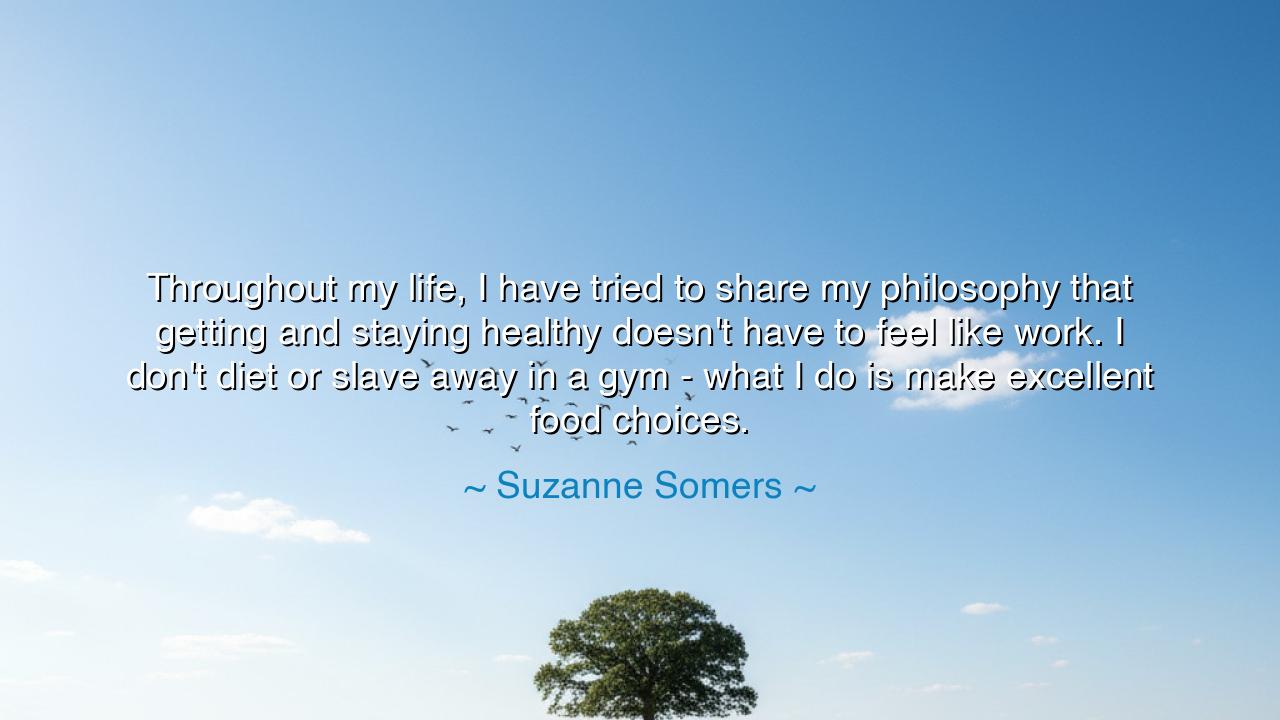
Throughout my life, I have tried to share my philosophy that
Throughout my life, I have tried to share my philosophy that getting and staying healthy doesn't have to feel like work. I don't diet or slave away in a gym - what I do is make excellent food choices.






"Throughout my life, I have tried to share my philosophy that getting and staying healthy doesn't have to feel like work. I don't diet or slave away in a gym – what I do is make excellent food choices." – Suzanne Somers
In these words lies a philosophy of harmony, not of struggle. Suzanne Somers speaks as one who has seen the futility of waging war against one’s own body. She calls us away from the iron discipline of suffering and into the quiet art of balance. Health, she says, is not a mountain to be conquered with pain and punishment, but a garden to be tended with care and joy. To get and stay healthy is not the task of a slave, but the choice of a free soul who honors their vessel—the body—as a sacred dwelling.
In ancient times, the Greeks spoke of sophrosyne—the virtue of moderation, the equilibrium of body and spirit. To live well was to eat well, to move with purpose, to delight in the gifts of the earth without greed. Suzanne’s words echo that timeless wisdom. She reminds us that discipline without joy is tyranny, and that nourishment—true nourishment—comes not from denial, but from reverence for what sustains us. In her gentle defiance of diets and gyms, she restores the old truth: that health is not built in torment, but in harmony.
Consider the tale of Hippocrates, father of medicine. When a wealthy man once came to him, begging for a potion to restore his strength, Hippocrates refused the cup and instead led him to the fields. “Walk with me,” he said. They walked among olives and wild thyme, breathing the sea air. “Eat of this land,” said the physician, “and let your food be your medicine.” The man returned weeks later, renewed. His cure had not been found in a vial, but in excellent choices—in the patient rhythm of simple, wholesome living. Suzanne Somers’ teaching is no different; it is a modern echo of that ancient faith in the natural and the enduring.
Her words are also a song of freedom—freedom from the illusion that health must be earned through suffering. In every age, humanity builds temples of pain: the ascetic’s cell, the athlete’s arena, the modern gym where mirrors reflect exhaustion. Yet Somers whispers to us that health is not a prison, but a pilgrimage. We need not chain ourselves to treadmills or starve our bodies into submission. Instead, we can choose wisely—in what we eat, in how we rest, in what we allow into our minds. Each choice is an act of creation, a brushstroke upon the canvas of our days.
Let us not mistake her message for idleness. To choose well demands awareness; to live freely requires strength of will. But it is a strength born of joy, not fear. Just as the farmer rises with the sun not because he must, but because he loves the dawn, so too should we rise to nurture our health—not as a duty, but as an act of love. For when health is rooted in joy, it endures; when it grows from guilt, it withers.
There is wisdom in simplicity. The body, that ancient instrument, thrives on what is pure, natural, and whole. The heart beats stronger not through punishment, but through gratitude. When we walk among trees, when we eat food that once knew the soil, when we laugh and rest without shame—these are the things that restore the sacred order within us. Suzanne Somers’ words remind us that in every meal, every breath, every moment of movement, we are making a choice between harmony and harm.
The lesson, then, is clear: health is not to be conquered—it is to be cultivated. Begin by listening—to your hunger, your fatigue, your joy. Choose foods that come from the earth, not the factory. Walk beneath the sky instead of beneath fluorescent light. Let your habits be guided not by guilt, but by gratitude. Do not “slave away” for health—live toward it. In this way, each day becomes an offering to the temple that is your body, and the spirit within it grows light and unburdened.
For those who hear her message, let it awaken a gentler power: the power to live with intention, not obsession; with pleasure, not punishment. The ancients would call such a life a form of wisdom. Suzanne Somers called it her philosophy. We might call it the art of being whole.






AAdministratorAdministrator
Welcome, honored guests. Please leave a comment, we will respond soon